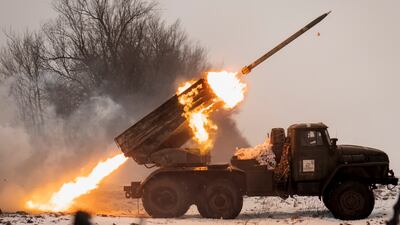The EU vowed to increase pressure on Moscow “until Ukraine is liberated” as it adopted a 10th package of sanctions on Saturday, a day after the first anniversary of the invasion of Ukraine.
The tougher measures came as German Defence Minister Boris Pistorius said on Sunday that his government was sceptical of a Chinese peace plan to end the war, days after US President Joe Biden said he did not believe Beijing had concrete suggestions to end fighting.
“When I hear reports — and I don't know whether they are true — according to which China may be planning to supply kamikaze drones to Russia while at the same time presenting a peace plan, then I suggest we judge China by its actions and not its words,” Mr Pistorius told German public broadcaster Deutschlandfunk.




























































Mr Pistorius has taken a tougher line on Russia's actions in Ukraine than his predecessor Christine Lambrecht, who left the role in January. Mr Pistorius has authorised countries that have purchased the German-made Leopard 2 tank to donate some of the vehicles to Ukraine, in contrast to Ms Lambrecht who held off making a decision on the issue.
Mr Pistorius’s remarks came as the EU stepped up sanctions on Moscow, attempting to cut off access to components needed for precision-guided weapons and cut into Moscow’s revenues.
“We now have the most far-reaching sanctions ever — depleting Russia's war arsenal and biting deep into its economy,” European Commission chief Ursula von der Leyen said on Twitter. The bloc was turning up the pressure on those trying to circumvent EU sanctions, she added.
EU foreign policy chief Josep Borrell warned the bloc would continue to pile more sanctions on Moscow.
“We will continue to increase pressure on Russia — and we will do it for as long as needed, until Ukraine is liberated from the brutal Russian aggression,” he said.
Mr Borrell said the latest sanctions tackled the banking sector, Moscow's access to technology that can be used for civilian and military purposes and advanced technologies.
Ukrainian President Volodymyr Zelenskyy welcomed the new punitive measures as “new powerful steps against the military industry and the financial sector of the terrorist state”.
Speaking in his nightly video address, Mr Zelenskyy said Ukraine was working to extend sanctions even further to cover Russia's nuclear sector, the state-owned nuclear energy company Rosatom “and all those involved in the missile programme and the nuclear blackmail of the terrorist state”.
The new EU package adds electronic components used in Russian weapons systems retrieved on the battlefield, including drones, missiles, helicopters, as well as specific rare earth materials, electronic integrated circuits and thermal cameras to the list of banned exports.
It also imposes tighter export restrictions on another 96 entities for supporting Russia's military and industrial complex, including for the first time seven Iranian entities manufacturing military drones used by Moscow.
Additional restrictions are imposed on imports of goods which generate significant revenues for Russia, such as asphalt and synthetic rubber.
Separately, the EU imposed sanctions on 11 individuals and seven entities linked to the Wagner group, whose mercenaries are fighting in Ukraine but are also involved in conflicts in African countries such as Mali.
In Moscow, Mr Putin is increasingly presenting the war as a make-or-break moment in Russian history — and saying that he believes the very future of Russia and its people is in peril.
“I do not even know if such an ethnic group as the Russian people will be able to survive in the form in which it exists today,” Mr Putin said in televised remarks on Saturday, arguing the West had a plan to break up the state.
The US has denied that it wants to destroy Russia, while Mr Biden has warned that a conflict between Russia and Nato could trigger the Third World War, though he has also said Mr Putin should not remain in power.

